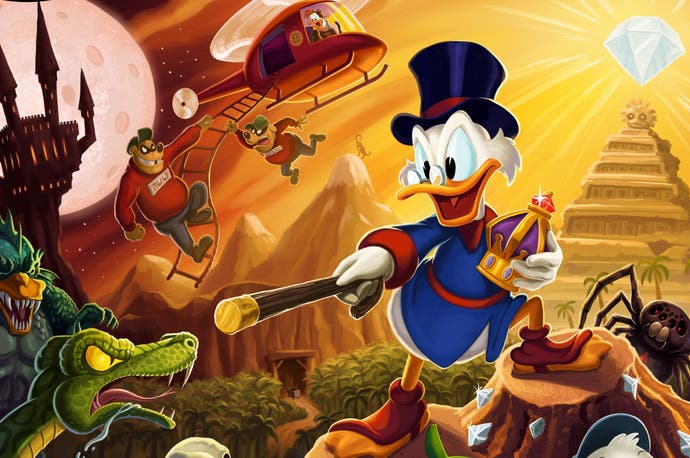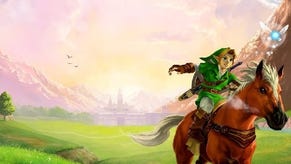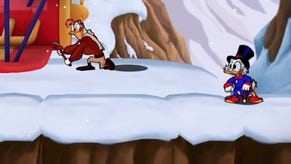DuckTales Remastered Review
Woo-ooo?
Let's get a quick test out of the way.
Does that ring any bells? Does it immediately have you tapping your feet in time and singing along? Or does it seem like gibberish to you? Because if it's the latter... well, there's not much here for you, I'm afraid.
Nothing makes you feel old like the moment companies start aiming their money-sucking nostalgia hoses in your direction. Though, for my fellow mid-twenties types, I suppose the existence of a Spice Girls musical was the first, terrifying portent of our impending mortality. Still, this is DuckTales, a cartoon that filled my after-school evenings and whose theme tune I couldn't forget if I tried.
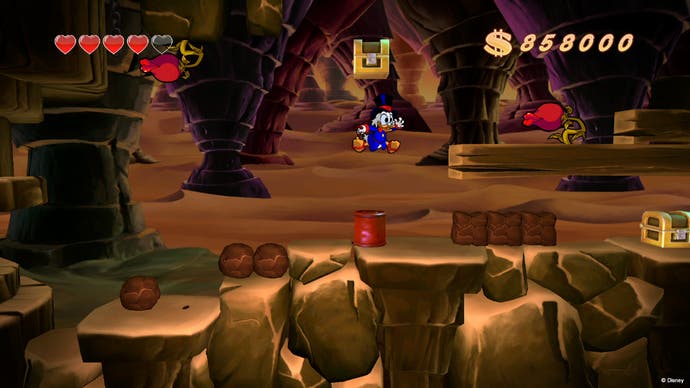
Admittedly, Capcom's NES game wasn't quite as vibrant in my memory. I knew I'd played it, but wasn't even sure if I'd actually owned a copy until I spotted some screenshots of a red-coat-wearing Scrooge McDuck and they tugged at dormant parts of my mind. And then I played DuckTales: Remastered, and all those unused synaptic connections reignited like lights flickering back on in dusty, forgotten rooms. It's a powerful drug, nostalgia - and there's no memory quite like muscle memory to trigger it, it seems.
Capcom has fired a laser-targeted nostalgia missile right at the hearts of gamers of a certain age, and WayForward has respectfully guided that payload to Earth
The arc of a pogo jump, the flight speed of a boulder smacked by Scrooge McDuck's cane, that secret passage down and to left of the first rope in the Amazonian jungle. The theme tune. Capcom has fired a laser-targeted nostalgia missile right at the hearts of gamers of a certain age, and developer WayForward has respectfully and carefully guided that payload to Earth. This is DuckTales: polished up to the point where it finally looks like the cartoon it was inspired by, but still playing like the NES game it used to be.
What that means, in fact, is a rather archaic platformer, both in the tasks it asks you to perform and in its level design. Those crude NES backgrounds might have been swapped for painterly backdrops that do a much better job of selling the idea that you're participating in a proper Walt Disney adventure than anything in the original game - but it's the foreground that matters, and for all the softening effect of WayForward's gorgeous art, that's still constructed from the same blocky right angles as before, filled with the same enemies who still respawn the moment you wander off screen.
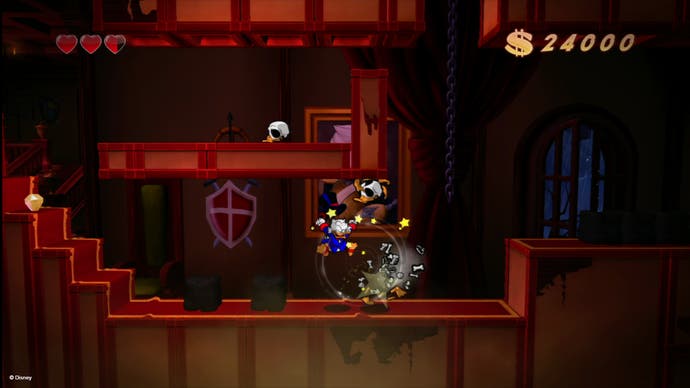
It needs to be so, of course, because this is a self-styled remastering, not a remake or - God forbid - a "reimagining". A brand new tutorial level reintroduces Scrooge's pogo jump, a bouncy, high-verticality manoeuvre that's still the core of the game. It's not that Scrooge can't do a normal jump - he's a NES-era video game star, after all - but to gain extra height, kill enemies or jump across dangerous surfaces you must whip out the pogo stick hidden in his cane. Traditionally, this was done by holding Down as well as the B or A button, but in a sacrilegious bit of tinkering WayForward has included an easy version of the move: merely hold B or X and Scrooge will happily pogo away indefinitely. This removes the tiny, satisfying flicker of skill needed to pull off a pogo jump, and I found it made boss battles considerably easier, despite the fact that WayForward has given the villains fresh attack patterns and moves. But even with the easy-pogo enabled, DuckTales remains reassuringly, horrifically retro in its difficulty.
For such a well loved title, DuckTales can be a wicked game, prone to vindictive little tricks like sticking enemies in corridors so cramped you end up with the merest fraction of a second to initiate a pogo jump before making contact. On Normal difficulty, you can only take two hits before dying and extra lives (remember those? DuckTales does) are exceedingly hard to come by. Run out and you'll have to restart the level from scratch, too, which made me splutter in disbelief until I remembered that I was playing game that's over 20 years old, and I had to concede a certain respect for WayForward's obstinate sense of authenticity.
That particular death was infuriating, because I'd bagged an awful lot of gems. DuckTales is a pure, old fashioned platformer, built around collecting things, jumping on things and occasionally hitting things. It's simple stuff, really. And the only real reward the game offers for doing all this is more money for everyone's favourite feathered oligarch to stick in his money bin. That's now a more tangible reward than in the original game: you can spend the cash to unlock artwork and other extras relating to the animated series, and most importantly you can enact your seven-year-old self's most dearly held fantasy and go swimming in Scrooge's money piles in a charmingly pointless dead end leading off the hub screen.
There's something odd about WayForward's insistence on telling a story. When we think back to games like DuckTales, we're remembering them for their story-free, contextless charms
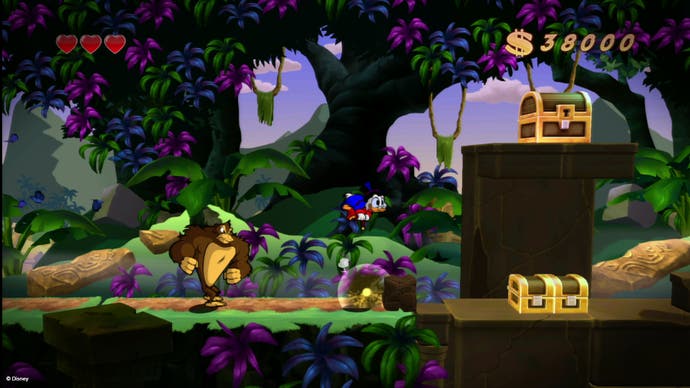
While the core mechanics remain entirely untouched, there has, in fact, been a great deal of structural nipping and tucking, much of which seems designed to squeeze in story and as well as gently guide the young 'uns of today, unaccustomed as they are to the instruction-free mystery of older games. So in the Amazon, for instance, you now need to find eight coins before you can access the Temple, and Scrooge will remind of you this fact every single time you grab a coin. Select any level, meanwhile, and you'll have the option of sitting through a gently amusing cut-scene: you slowly walk across the Transylvianian castle's flame-lit drawbridge, now, rather than materialising in a puff of narrative incoherence.
There's something odd about WayForward's insistence on telling a story. When we think back to games like DuckTales, we're remembering them for their story-free, contextless charms; their odd habit of dropping you in places like the Himalayas without explanation. We're not lamenting the fact that there wasn't an introductory cut-scene explaining how Scrooge could breathe on the moon.
This is DuckTales: Remastered's biggest problem. For its target audience - those late 20s, early 30s gamers who remember blowing on the NES cart's connectors when it wouldn't load - the impact of WayForward's high-purity dose of old-fashioned platforming has been diluted by the new wrapping. Even those new backgrounds, as lovely as they are, pull the eye away from the parts of the level that have actually been recreated. For the Pixar generation, meanwhile, there's just a quaint, old-school platformer here, starring a character of whom they've never heard.
